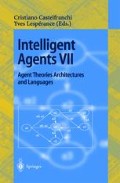Abstract
In agent systems, different (autonomous) agents collaborate to execute complex tasks. Each agent provides a set of useful capabilities, and the agent system combines these capabilities as needed to perform complex tasks, based on the requests input into the system. Agent communication languages (ACLs) allow agents to communicate with each other about how to partition these tasks, and to specify the responsibilities of the individual agents that are invoked. Current ACLs make certain assumptions about the agent system, such as the stability of the agents, the lifetime of the tasks and the intelligence of the agents in the system, etc. These assumptions are not always applicable in information-centric applications, since such agent systems contain unreliable agents, very long running tasks, agents with widely varying levels of sophistication, etc. Furthermore, not all agents may be able to support intelligent planning towork around these issues, and precanned interactions used in more component-based systems do not work well. Thus, it becomes important that proper support for task coordination be available to these agent systems. In this paper we explore issues related to coordinating large, complex, long running tasks in agent systems. We divide these issues into the following categories: tasks, roles, and conversations. We then discuss how these issues impose requirements on ACL, and propose changes to support these requirements.
Access this chapter
Tax calculation will be finalised at checkout
Purchases are for personal use only
Preview
Unable to display preview. Download preview PDF.
References
R. Bayardo et al. Semantic integration of information in open and dynamic environments. In Proc. ACM SIGMOD Int’l Conf. on Management of Data. ACM Press, 1997.
Jeffrey M. Bradshaw. An introduction to software agents. In J. Bradshaw, editor, Software Agents, chapter 1. MIT Press, AAAI Press, 1997.
T. Finin and G. Wiederhold. An overview of KQML: A knowledge query and manipulation language, 1991. (Available through the Stanford University Computer Science Department.).
Object Management Group and X/Open. The Common Object Request Broker: Architecture and Specification, Revision 1.1. JohnWiley and Sons, 1992.
Y. Labrou. Semantics for an Agent Communication Language. PhD thesis, University of Maryland at Baltimore County, September 1996.
Y. Labrou and T. Finin. A proposal for a new KQML specification, 1997. http://www.cs.umbc.edu/kqml/kqmlspec.ps.
M. Nodine and A. Unruh. Facilitating open communication in agent systems. In Munindar Singh, Anand Rao, and Michael Wooldridge, editors, Intelligent Agents IV: Agent Theories, Architectures, and Languages. Springer-Verlag, 1998.
Marian Nodine and Damith Chandrasekhara. Agent communication languages for information-centric agent communities. In Proc. Hawaii Int’l Conf. on System Sciences, 1999.
Marian Nodine et al. Active information gathering in InfoSleuth. Int’l Journal of Cooperative Information Systems, 9(1/2):3–28, 2000.
A. Tomasic, L. Raschid, and P. Valduriez. Scaling heterogeneous databases and the design of DISCO. In Proc. Int’l Conf. of Distributed Computing Systems, pages 449–457, 1996.
Author information
Authors and Affiliations
Editor information
Editors and Affiliations
Rights and permissions
Copyright information
© 2001 Springer-Verlag Berlin Heidelberg
About this paper
Cite this paper
Nodine, M., Chandrasekara, D., Unruh, A. (2001). Task Coordination Paradigms for Information Agents. In: Castelfranchi, C., Lespérance, Y. (eds) Intelligent Agents VII Agent Theories Architectures and Languages. ATAL 2000. Lecture Notes in Computer Science(), vol 1986. Springer, Berlin, Heidelberg. https://doi.org/10.1007/3-540-44631-1_12
Download citation
DOI: https://doi.org/10.1007/3-540-44631-1_12
Published:
Publisher Name: Springer, Berlin, Heidelberg
Print ISBN: 978-3-540-42422-2
Online ISBN: 978-3-540-44631-6
eBook Packages: Springer Book Archive

